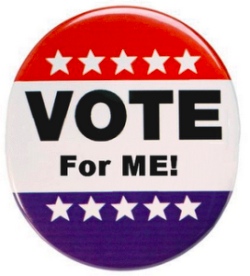 This is the time in the election cycle when I’m starting to hear from a lot of people asking for support in the 2014 election. Some people want moral support. Others want money. (Well, they all want money.)
This is the time in the election cycle when I’m starting to hear from a lot of people asking for support in the 2014 election. Some people want moral support. Others want money. (Well, they all want money.)
Many of them are good people and I like a lot of them. But I can’t support any of them in good conscience, because I can’t support the system they’ve chosen to join. To save myself from having to reply to every candidate personally and explain the reason, let me explain to everybody all at once.
If you’re running for office, I don’t necessarily oppose you personally, but I oppose the entire system of coercion that majoritarianism represents. You’re probably a decent person. You probably mean well. But for anything to change, the entire structure of the system has to change. Just electing you — or even hundreds or thousands of people like you — isn’t going to change anything.
If you grew up in this country, you were probably taught to revere the political system that’s in place. You heard propaganda in school about how great the system was. You were taught that “democracy” and “freedom” mean the same thing. (You were lied to.) You were taught the fiction that if honest men (and women) would just “do the right things,” the system would produce peace, prosperity and freedom for all. After all, it worked in “Mr. Smith Goes to Washington,” didn’t it?
But there’s no evidence for what you were taught. There’s only evidence that a system that was set up with the best of intentions more than 200 years ago is no different from any other system in one simple regard. People in power will always take more power — and they’ll always give lip service to founding principles while they do whatever they want. (Read the text of the Constitution and the Federalist Papers and then compare the intent with what it’s become.)
The problem is that the system is flawed at its root. The system was set up as a republic, not a democracy, but few people even understand the difference between the two anymore. As progressives gained more and more power over the last hundred years or so, the fiction was dropped entirely. It turned into a democracy — where pretty much any majority can force its will on the rest of us. A republic was bad enough, but a real democracy is infinitely worse, which is why the people who founded this country didn’t want a democracy.
For instance, in a letter to John Taylor in 1814, John Adams made clear what he thought on the matter: “Remember, democracy never lasts long. It soon wastes, exhausts, and murders itself. There never was a democracy yet that did not commit suicide. It is in vain to say that democracy is less vain, less proud, less selfish, less ambitious, or less avaricious than aristocracy or monarchy. It is not true, in fact, and nowhere appears in history. Those passions are the same in all men, under all forms of simple government, and when unchecked, produce the same effects of fraud, violence, and cruelty.”
I don’t believe in a system that give power to the majority to rule over the rest of us. I don’t believe it’s moral and I believe it’s destined to always give us what we have now (or worse). Simply changing the identities of the people who hold power isn’t going to change anything.
So I know you were taught to believe the system could produce freedom and prosperity for everyone. And I know you have good intentions and think you can be different if you get elected. But I don’t believe that.
I believe that the system corrupts people with good intentions. I believe that people who aren’t corrupted are eventually destroyed or marginalized. And I believe that even if you can be the rare person who keeps his principles and doesn’t cave in, you’re not going to be able to change anything of substance. You’re going to spend a tremendous amount of time and effort, but you’re not going to make the difference you imagined when you started.
I don’t know yet how to change the system. It’s not going to change until a critical mass of people want the entire system changed. But I do know that continuing to participate — pretending that systemic problems can be changed by re-arranging who’s occupying which chairs — is just distracting people from the real, underlying problems.
You probably mean well. You probably think you can make a difference. But I don’t believe so. And I can’t support your campaign for that reason. I just don’t think it’s the right thing to do. I’m sorry.
 Life’s path can change direction when you’re ready for real love
Life’s path can change direction when you’re ready for real love Your narratives shape your politics, religion, friendships, relationships
Your narratives shape your politics, religion, friendships, relationships Moral priorities: ‘If we free the slaves, who will pick the cotton?’
Moral priorities: ‘If we free the slaves, who will pick the cotton?’